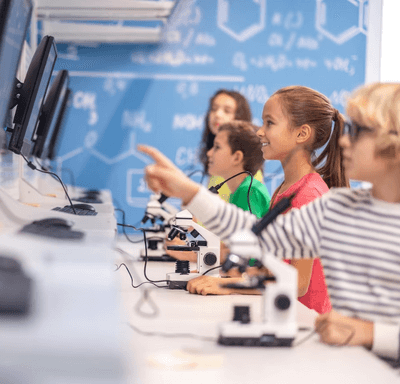
About us
Our Services
Our Expertise
Our Experience
Follow us
Why e2logy?
- We strive to provide superior customer service and ensure that every client is completely satisfied with our work.
- Our engineers are trustworthy, dedicated, and experienced and will go the extra mile to solve your IT issues.
- We are committed to delivering outstanding, cutting-edge IT solutions that add real value that goes beyond what is expected.

The Role of Artificial Intelligence in Education

Computers, specifically computer systems, can process human intelligence and create artificial intelligence. By combining human language processing, speech recognition, and machine vision, AI can smooth out human interaction with machines.
AI is becoming increasingly popular around the world. In education, as in every other sector, artificial intelligence has revolutionized the way we do business. Educators and students alike greatly benefit from it.
The use of artificial intelligence at present is aimed at improving the teaching methods of schools and colleges, and achieving better results.
Role of artificial intelligence in education
We are teaching and learning differently because of the widespread adoption of technology in education. A disruptive technique that allows for customized learning experiences for groups and teachers is artificial intelligence.
To improve study processes, Artificial Intelligence tools can be used as follows:
1. Personalize Education
By identifying students’ knowledge gaps and creating personalized study schedules for them, artificial intelligence can help find out what each student knows and does not know. A computer can tailor learning according to the needs of students, increasing their efficiency in the process.
Through training AIs, based on Knowledge Space Theory, knowledge gaps can be identified and represented, taking into account the complexities of scientific concepts and their relationships (one can stimulate another’s learning or provide a basis for filling a gap in knowledge).
2. Artificial intelligence automates basic education activities
Teacher activities such as grading tests and working on homework consume a lot of their time in the education system. When you do these tasks, you have to spend a lot of time and effort on them. Instead, you might spend that time interacting with students, pointing out their errors, teaching new concepts, etc.
Artificial intelligence can help save time in this situation. Artificial intelligence (AI) tools are being used to automate grading systems for MCQ (Multiple Choice Questions) and fill-in-the-blank questions, leading to the possibility of marking writing assignments as well. Even though AI is still not able to completely replace human grading, it’s getting better and better each day. It will save teachers’ time by allowing them to devote more time to filling in the gaps in their classrooms, rather than spending their time on these tedious duties.
3. Students’ needs can be met through educational software
Artificial intelligence plays a crucial role in improving education through personalization from kindergarten through school. Currently, half of this is accomplished by developing a multitude of versatile learning projects, games, and computer programs.
The system goes according to the student’s needs, emphasizing specific subjects, repeating things that the student may not understand, and generally assisting the student in learning at his or her own pace.
In a machine-aided solution, this kind of personalized education could be used by students of all levels to help them succeed, from working together in one classroom, with teachers supporting and helping students as they learn, to simple things like offering an easy calculator for calculating GPA.
There is no doubt that adaptive learning is a huge influence on education around the globe, and developments in AI are forecast to have a positive impact on such projects in the coming years.
4. Personalized lessons
Knowledge gaps are best addressed with personalized learning. Students will understand two, three, or more lessons from the first lesson. However, what about students who do not? An artificial intelligence program could tailor lesson content to meet the needs of each student.
An advantage of customized learning is that it targets particular learning styles and needs. The learning will be done at the pace and style that is most convenient for each individual.
5. Students with AI tutors receive additional support
Teachers cannot remain with students throughout the study session as they have fixed working hours in colleges. It takes additional help from someone to help students understand study material since each student is not smart enough to grasp everything at once. AI tutors can provide this additional assistance.
Students can learn basic mathematics, writing, and other subjects with the help of artificial intelligence-driven tutoring programs.
However, these AI programs are not suitable for learning high-level concepts in any subject. Students can learn the basics, but they cannot learn the more advanced concepts. Despite the complexity of these concepts, a professor is still necessary for students to understand them. It is possible, however, that in the future AI can also assist students with complex and analytical problems that require analytical reasoning and thinking.
6. Courses can be improved based on the results
Many teachers are unaware that their lectures and instructional materials could have gaps that could have left some students confused. This problem can be solved using artificial intelligence. This has already been incorporated by Coursera, a large provider of open online courses.
As students are found to be submitting incorrect answers to homework assignments, the AI alerts teachers and provides personalized guidance to the students. It provides future students with a modified message that gives clues to the correct answer when students repeatedly present unacceptable answers to a schoolwork task.
With AI, students will be able to learn any new topic in a way that fills the gaps in their education. By doing this, we ensure that all students are laying a similar conceptual foundation from the beginning.
7. Students and educators can benefit from AI-driven programs
As well as helping teachers and students design courses tailored to their individual needs, artificial intelligence can also provide them with feedback about their course’s success. Students’ progress is monitored and professors are alerted by AI systems in some schools, particularly those with online courses.
Professors can use these tools to find areas where they can improve instruction for students who struggle with the subject matter, and students can receive the support they need. There is more to AI programs than just advising on individual courses at these schools. Some are developing systems to help students decide what major to pursue based on where they excel and struggle. Shortly, future students will have access to a brave new world when it comes to choosing college majors.
8. 24/7 Assistance
The use of AI isn’t limited to teachers. It’s available to everyone. The same goes for students. The AI bots can assist them at any time on any topic.
A student’s problems are traditionally solved only when she meets with her teacher, or when she has the opportunity to ask her professor questions in class. The wait will be over soon, thank goodness.
In the education industry, several AI-powered chatbots have been developed. Throughout the day and night, they serve as students’ assistants by answering their queries whenever they need them. This means they don’t have to wait in class or in the office to see the professor.
9. Students with disabilities should have access to education
Learning disabilities can now be addressed in new ways thanks to the adoption of AI technologies. The use of AI in education allows deaf and hard-of-hearing students, visually impaired students, and students with autism to enrol in classes with their peers.
Almost any group of students with special needs can be successfully assisted by artificial intelligence tools.
10. Global Access
Students can access educational classes worldwide, regardless of their hearing or visual impairments. Artificial intelligence tools play a significant role in making this possible. An Excel plugin like Presentation Translator translates all teacher comments into subtitles for students in real-time. In this way, kids who miss school due to illness or require a different level of instruction have access to new learning opportunities. In the future, artificial intelligence will be able to break down traditional grade level and school barriers.
Conclusion
Many segments of our lives are becoming more dependent on artificial intelligence each day. As AI makes its way into the education sector, it’s proving useful for both students and teachers as a tool to support learning. It will take a long time for all colleges to adopt AI in education completely, as it is not quite adapted yet. The sector of education will, however, benefit from AI shortly, according to studies. Despite its potential in education, it is still transforming the education industry. It is unlikely that computer systems will fully replace human teachers in schools and colleges, but they can be a very helpful tool.













